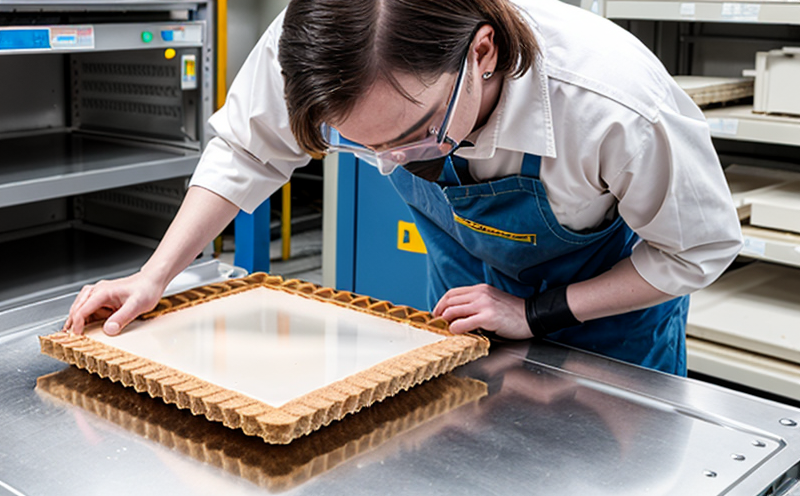ASTM F619 Wafer Cleaning Process Validation Testing
The ASTM F619 standard specifies a process for cleaning semiconductor wafers and substrates to ensure they are free from contaminants that could adversely affect the subsequent manufacturing processes. This testing ensures that the wafer surface meets critical cleanliness requirements as defined in the standard.
ASTM F619 focuses on the chemical mechanical planarization (CMP) process, which is a key step in semiconductor fabrication where wafer surfaces are polished to achieve uniformity and flatness. Contamination during this phase can lead to defects or failures in subsequent processes like photolithography and etching.
The testing procedure involves cleaning the wafer using specified chemicals followed by an evaluation of the cleanliness level through various analytical methods such as scanning electron microscopy (SEM) and energy-dispersive X-ray spectroscopy (EDS). The goal is to validate that the process adheres to defined contamination limits, which are critical for ensuring product quality.
The testing protocol typically includes:
- Preparation of the wafer according to ASTM F619 specifications
- Cleaning using approved chemicals and procedures
- Evaluation through SEM/EDS analysis
- Comparison against defined contamination limits
The results are reported in compliance with ASTM F619, providing assurance to manufacturers that their cleaning processes meet stringent industry standards. This is vital for maintaining high-quality semiconductor products.
| Industry Application | Description |
|---|---|
| Silicon Wafer Manufacturing | Ensuring the cleanliness of silicon wafers before they undergo further processing steps such as doping and thin-film deposition. |
| CMP Process Optimization | Validating the effectiveness of CMP processes in achieving the desired surface finish without introducing unwanted contaminants. |
| Substrate Preparation for Packaging | Verifying that substrates are clean and free from contamination before they go into the packaging phase to ensure long-term reliability. |
| Research & Development | Supporting R&D efforts by providing data on cleaning processes and their impact on wafer quality. |
The ASTM F619 test is a critical step in the semiconductor manufacturing process, ensuring that wafers are prepared for subsequent processing without introducing contamination. This helps to enhance the reliability of the final products and supports compliance with international standards.
Industry Applications
| Industry Application | Description |
|---|---|
| Silicon Wafer Manufacturing | This application ensures that silicon wafers are free from contaminants before they undergo further processing steps such as doping and thin-film deposition. |
| CMP Process Optimization | Validating the effectiveness of CMP processes in achieving the desired surface finish without introducing unwanted contaminants. |
| Substrate Preparation for Packaging | Verifying that substrates are clean and free from contamination before they go into the packaging phase to ensure long-term reliability. |
| Research & Development | Supporting R&D efforts by providing data on cleaning processes and their impact on wafer quality. |
The ASTM F619 test is a critical step in the semiconductor manufacturing process, ensuring that wafers are prepared for subsequent processing without introducing contamination. This helps to enhance the reliability of the final products and supports compliance with international standards.
Eurolab Advantages
At Eurolab, we provide ASTM F619 Wafer Cleaning Process Validation Testing with a comprehensive approach that ensures accuracy, consistency, and reliability. Our team of experts is well-versed in the latest techniques and standards, ensuring that our testing meets or exceeds industry expectations.
- Accurate Results: Utilizing state-of-the-art equipment for SEM/EDS analysis to ensure precise contamination levels are measured.
- Consistency: Our rigorous quality control processes guarantee consistent results across multiple tests.
- Compliance: Ensuring all tests comply with ASTM F619 and other relevant standards, providing confidence in meeting regulatory requirements.
- Expertise: Leveraging our team’s deep experience in semiconductor manufacturing to provide insightful testing results.
We offer a full suite of services tailored to your specific needs, ensuring that you receive the highest quality testing and support for your wafer cleaning processes.
Why Choose This Test
- Maintains product reliability by ensuring no contamination is introduced during CMP processes.
- Supports compliance with international standards, enhancing the reputation of your products in global markets.
- Provides data that can be used to optimize cleaning processes and improve overall manufacturing efficiency.
- Offers a high level of accuracy through the use of advanced analytical techniques like SEM/EDS.
The ASTM F619 test is an essential step in ensuring the quality and reliability of semiconductor products. By choosing this test, you are investing in the future success of your manufacturing processes.





